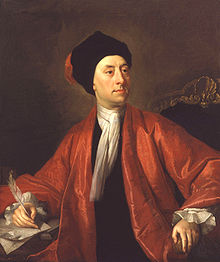When poets wrote and painters drew
As Nature pointed out the view,
Ere Gothic forms were known in Greece
To spoil the well-proportion'd piece;
And in our verse ere Monkish rhymes
Had jangled their fantastic chimes;
Ere on the flowery lands of Rhodes
Those knights had fix'd their dull abodes,
Who knew not much to paint or write,
Nor cared to pray, nor dared to fight;
Protogenes, historians note,
Lived there, a burgess, scot and lot;
And as old Pliny's writings show
Apelles did the same at Co.
Agreed these points of time and place,
Proceed we in the present case.
Piqued by Protogenes's fame,
From Co to Rhodes Apelles came
To see a rival and a friend,
Prepared to censure or commend;
Here to absolve, and there object,
As art with candour might direct.
He sails, he lands, he comes, he rings;
His servants follow with the things:
Appears the governante of the house,
For such in Greece were much in use;
If young or handsome, yea or no,
Concerns not me or thee to know.
Does Squire Protogenes live here?
Yes Sir, says he, with gracious air,
And curtesy low, but just call'd out
By lords peculiarly devout,
Who came on purpose, Sir, to borrow
Our Venus for the feast to-morrow
To grace the church: 'tis Venus day;
I hope Sir you intend to stay
To see our Venus: 'tis the piece
The most renown'd throughout all Greece
So like th' original they say;
But I have no great skill that way.
But, Sir, at six ('tis now past three)
Dromo must make my master's tea:
At six, Sir, if you please to come,
You'll find my master, Sir, at home.
Tea, says a critic, big with laughter,
Was found some twenty years ages after.
Authors, before they write, should read,
'Tis very true; but we'll proceed.
And, Sir, at present would you please
To leave your name - Fair maiden, yes.
Reach me that board. No sooner spoke
But done. With one judicious stroke
On the plain ground Appelles drew
A circle regularly true.
And will you please, Sweet-heart, said he,
To show your master this from me?
By it he presently will know
How painters write their names at Co.
He gave the pannel to the maid.
Smiling and curtesying, Sir, she said,
I shall not fail to tell my master:
And, Sir, for fear of all disaster
I'll keep it my own self : Safe bind,
Says the old proverb and safe find.
So, Sir, as sure as a key or lock -
Your servant, Sir, - at six o'clock.
Again at six Apelles came,
Found the same prating civil dame.
Sir, that my master has been here
Will by the board itself appear:
If from the perfect line be found
He has presumed to swell the round,
Or colours on the draught to lay,
'Tis thus, (he order'd me to say)
Thus write the painters of this isle;
Let those of Co remark the style.
She said; and to his hand restored
The rival pledge, the missive board.
Upon the happy line were laid
Such obvious light and easy shade,
That Paris' apple stood confest,
Or Leda's egg, or Cloe's breast.
Apelles view'd the finish'd piece;
And live, said he, the arts of Greece!
Howe'er Protogenes and I
May in our rival talents vie;
Howe'er our works may have exprest
Who truest drew or colour'd best,
When he beheld my flowing line
He found at least I could design;
And from his artful round I grant
That he with perfect skill can paint.
The dullest genius cannot fail
To find the moral of my tale;
That the distinguish'd part of men,
With compass, pencil, sword, or pen,
Should in life's visit leave their name
In characters which may proclaim
That they with ardour strove to raise
At once their arts and country's praise;
And in their working took great care
That all was full, and round, and fair.
Protogenes And Apelles
Matthew Prior
(1)
Poem topics: fear, friend, happy, heart, home, hope, house, laughter, life, light, nature, paris, time, pray, sweet, grant, raise, fight, young, shade, Print This Poem , Rhyme Scheme
Submit Spanish Translation
Submit German Translation
Submit French Translation
Write your comment about Protogenes And Apelles poem by Matthew Prior
Best Poems of Matthew Prior
